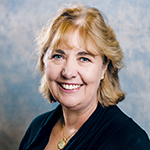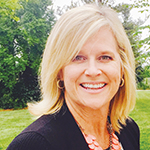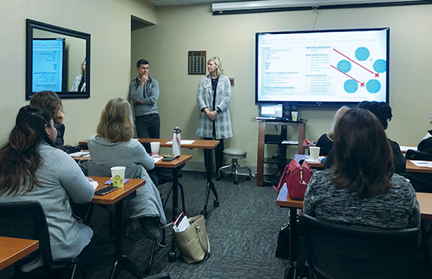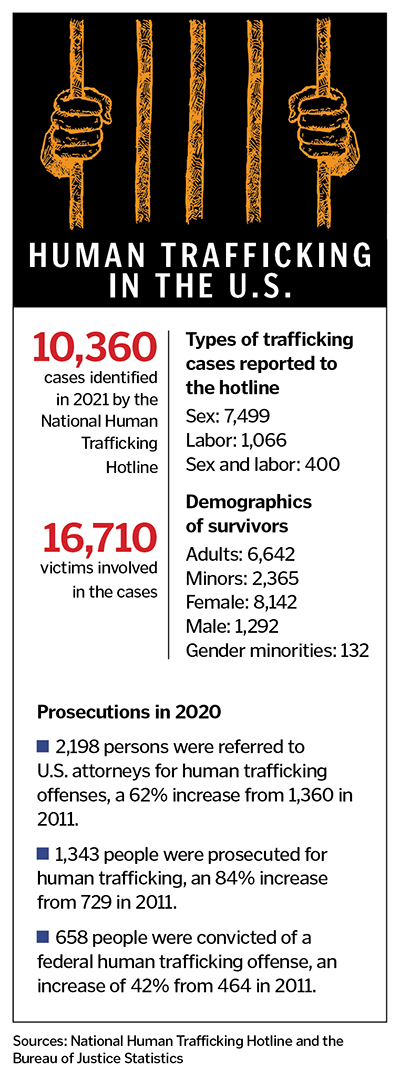By LISA EISENHAUER
One of the patients seen at the Human Trafficking Medical Safe Haven Program's clinic at Dignity Health Medical Group — Northridge in suburban Los Angeles was a woman in her 60s who had been a captive domestic servant for 10 years and spoke no English.
The woman had untreated diabetes that had created vision problems. She had a heart attack as those problems were being addressed.
She received outpatient care through the clinic and inpatient care at Dignity Health — Northridge Hospital Medical Center as she transitioned from victim to survivor and on to a new life through the collaboration of her care team, law enforcement and
community-based organizations.
 Davis
DavisDr. Pamela Davis, the physician group's medical director and the designated champion of its safe haven clinic, says caring for patients who have endured the trauma of being trafficked and held captive is eye-opening for care providers.
"I think many people don't understand or realize that these kinds of trafficking experiences are happening not very far away," she says.
Safe spaces for care
Jennifer Cox is system director in charge of the medical safe haven program,
an offshoot of Dignity Health's Human Trafficking Response Program. Dignity Health launched the
latter program systemwide in 2014 to better identify trafficking victims in health care settings and to provide these patients with trauma-informed care. Studies have shown that many victims of sex and labor trafficking have contact with health care
providers.
 Cox
CoxA study done by the nonprofit anti-trafficking organization Polaris found that survivors consistently reported disheartening interactions with medical care providers "ranging from a dismissal of their pain or symptoms, snide or insensitive comments or questions, to more overt harassing behavior such as victim blaming,
or even abuse by emergency health professionals."
When the Human Trafficking Response Program began, Cox was working in community health and outreach
for Dignity Health. She built relationships with community-based groups offering safe harbor and services to trafficking survivors. Cox worked with the groups to figure out how health care providers and social service providers could improve access
to care and services. Among the things she learned in the process was that most trafficking victims got only episodic care, such as in emergency rooms.
 Dr. Ron Chambers, medical director of the Human Trafficking Medical Safe Haven Program, and Jennifer Cox, system director in charge of the program, speak with resident physicians during a training session.
Dr. Ron Chambers, medical director of the Human Trafficking Medical Safe Haven Program, and Jennifer Cox, system director in charge of the program, speak with resident physicians during a training session.It was while doing that work that Cox met Dr. Ron Chambers, who directs the Dignity Health Methodist Hospital of Sacramento Family Medicine Residency Program in California. Chambers had gone through training as part of the Human Trafficking Response Program.
He wanted to use that training to develop a model to provide longitudinal care for trafficking victims in a safe clinical space.
Working on the steering committee with Holly Austin Gibbs,
system director of the Human Trafficking Response Program, Chambers and Cox developed the Human Trafficking Medical Safe Haven Program and launched the first safe haven clinic in 2016 at Mercy Family Health Center, a family medicine residency training center on the campus of Dignity Health Methodist.
Chambers is the safe haven program's medical director.
Today Dignity Health has medical safe haven programs with clinics in Sacramento, Santa Maria, Redding, San Francisco and Los Angeles that are connected to three-year family and internal medicine residency programs. The integrated care model provides trafficking
survivors with primary care; prenatal and obstetrical care; newborn, pediatric and adolescent care; mental health support; vaccinations; testing and treatment for sexually transmitted diseases; and other essential services. CommonSpirit, Dignity Health's
parent, plans to start another medical safe haven program in Merced next year.
All of the family practice residents complete a 10-week curriculum on caring for human trafficking survivors. They learn how to identify trafficking victims and survivors and provide appropriate, trauma-informed care.
Bases for trauma training
Trauma-informed care emphasizes physical, psychological and emotional safety for both providers and survivors and creates opportunities for survivors to rebuild a sense of control over their
lives.
Cox says graduates of the family practice residency spread their knowledge and skills about treating human trafficking survivors and trauma-informed care across the country as they move on from their medical residencies. Through 2022, 424 resident physicians
had gotten the training and treated 523 trafficking survivors.
The residents get the practice they need to become the experts in their field on care of trafficking victims, Cox says. "The patients get access to the qualified and compassionate physicians they need to get healthy and stabilized," she adds.
Dr. Kiersten Kelly, a resident in her second year of training at Mercy Family Health Center, says she was excited about the safe haven clinic when she interviewed for the family medicine residency. She says her appreciation for the training she is getting
in trauma-informed care continues to grow.

"I have realized how special it is and how applicable it is to not just victims and survivors of human trafficking in our medical safe haven program, but also to all of our patients who we see with histories of trauma and needing or necessitating trauma-informed
care," Kelly says.
'We make sure everyone is OK'
Kelly and the other 19 residents in the program at Mercy Family Health Center each provide care to about 25 patients through the safe haven clinic. They block off a half-day on their schedules
for the safe haven clinic and see just a few patients during that time. The patients bypass the waiting rooms in family practice suites and go into private exam rooms as soon as they arrive. Each appointment lasts 60 to 90 minutes. The time slots
are considerably longer than typical medical visits to allow the residents to develop a rapport and build trust with the patients.
The residents get a briefing from the clinic's staff — which includes a program director, program coordinator and an embedded patient advocate — in advance of appointments. The briefings cover patients' histories and conditions and any issues that need
to be brought up. The residents work to develop a lasting primary care relationship with the patients.
After visits, the residents take part in debriefings to decompress and minimize their own stress and anxiety from caring for patients whose experiences of being forced into sex work, branded, beaten and more can be shocking. As Davis, whose career also
includes many years as an instructor in family medicine at the University of California, Los Angeles, and as a program director for family medicine residents, explains: "We make sure everyone is OK. We've never had to offer our staff any outside help,
but if we needed to, we would."
'Bridge of trust'
The embedded patient advocate at each clinic is employed by the clinic and a partner agency that works with trafficking victims and survivors. The advocates schedule appointments, arrange transportation,
accompany patients on their medical visits and advocate for patients with care providers.
Cox says a key to the success of each safe haven clinic is building what she calls "a bridge of trust" between the clinic and other stakeholders who provide resources for trafficking victims, including law enforcement, shelters and social services agencies.
That bridge, she says, allows for a smooth flow of services to keep trafficking victims safe while addressing their health, counseling, housing, food and other needs.
 Vaden
VadenSawan Vaden is executive director of Community Against Sexual Harm, a nonprofit that provides mentoring, housing, employment and other assistance to women who are trafficking survivors in Sacramento. Vaden calls the safe haven clinic a crucial partner
to her organization.
She says the clinic gets patients in quickly, usually within 72 hours, and the clinicians provide care without the judgment the women and their children have faced in other interactions with care providers. "It takes away the fear that the women have
from their previous experience with medical personnel," she says.
Many of the women haven't had regular access to a medical care provider, Vaden explains. "They don't know how to talk to the doctors," she says. "They don't know how to advocate for their own needs."
Part of the care the women get at Mercy Family Health Center clinic is coaching on having autonomy over their own bodies, which previously had been under the control of their traffickers, Vaden says.
Measuring success
Cox says she and the others leading the Human Trafficking Medical Safe Haven Program are collecting data on its now thousands of patient encounters to monitor its success. One of the metrics they are
looking at is the self-sustainability and resilience rate of trafficking victims who become established in the medical safe haven program versus those who do not.
Cox says patients express their gratitude and tell their patient advocates things like: "I've never been treated like this before. I have hope. I feel like this is my family."
She says directors of the residency programs that take part in the safe haven program tell her, "Yes, we're going to continue this. This is helping our doctors become better doctors. This is healing our general patient population because they're enacting
these trauma-informed best practices. It's making our communities healthier, and it's giving us a unique opportunity" to teach a generation of physicians to provide patient-centered, trauma-informed care.
What is trauma-informed care?
The core tenets of trauma-informed care, as defined by the Substance Abuse and Mental Health Services Administration, include:
Safety: Throughout the organization, staff and patients should feel physically and psychologically safe.
Trustworthiness and transparency: Organizational operations and decisions are conducted with transparency and with the goal of building and maintaining trust among staff, patients and family members.
Peer support: Support from clinical peers is integral to the organizational and service delivery approach and is a key vehicle for building trust, and for establishing safety and empowerment.
Collaboration and mutuality: There is a true sense of partnership between organizational leaders, staff and patients.